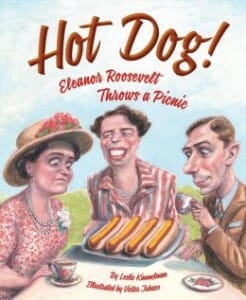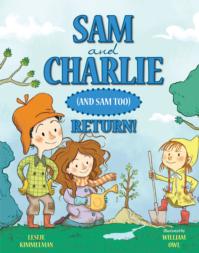
Award-winning children’s author
Today, I have the pleasure of introducing my readers to Leslie Kimmelman. For decades, she has used her creative energies to edit books for Sesame Street Workshop and write award-winng children’s books. Her clever works have included notable titles such as The Little Red Hen and the Passover Matzah and Mind Your Manners, Alice Roosevelt. More recently she released Hot Dog! Eleanor Roosevelt Throws a Picnic. To date, she has published 22 books that appeal to a wide variety of readers.
In exchange for an honest interview and review, Leslie sent me a couple of books. Leslie is participating in a book giveaway. Remember to leave a comment on this blog so that you will be eligible.
Welcome Leslie.
Your love of reading opened the door to a rewarding editing career. What caused you to shift part of your focus to writing children’s books?
I’ve never really shifted away from editing, which I continue to enjoy. It’s fun seeing a book come into fruition from both vantage points! I started writing after a few years as a children’s book editor, because the more manuscripts I read, the more I realized that I wanted to tell my own stories.
All writers experience setbacks. Some are in the form of writer’s block, while others are in response to book proposal rejections. Can you suggest 3 strategies to overcome these common obstacles?
- I tell myself that every author gets rejections, from Beatrix Potter to J.K. Rowling. If I believe something works, I persevere.
- If I have writer’s block, I take it as a sign to put that particular story away for a while and try something completely new. Or to take a long walk outside.
- I know there are a lot of authors who have a regimen where they sit down at their computer for a certain number of hours per day to write—anything. That’s never worked for me. If I have writer’s block, I just stop writing until a new and compelling idea comes to me.
Memorable picture books capture the readers’ attention via words and images. Are you able to provide any feedback to your illustrators, or is that role left up to your publisher? Have you ever experienced a gap in understanding between your intended meaning and the artist’s interpretation?
Usually all communication with the artist is through the editor. However, in my nonfiction books, I’ve usually done some research that will be helpful to the artist. And the same is true of my Jewish-themed books: I’m usually giving at least some direction. A good editor wants the author to be happy with the illustrations and enlists his/her help. But you do have to realize that it’s also the artist’s book, and frequently the artist brings a whole new vision to the table. Though there have been a few books where I am not excited about the final art, most of the time it exceeds my expectations.
Eleanor Roosevelt’s picnic is a footnote in history. When did you first learn of this unusual event? How did you research the facts? What prompted you to use the story as a focal point for a historical fiction picture book?
I am a total history nerd and think it’s important for kids to know history. So I’m always looking for a good way in. I happened to hear about this picnic when my husband and I were visiting the Roosevelt historic site in Hyde Park, New York. The docent told the story, then showed us a thank you note the queen had written to the Roosevelts after the event. I immediately turned to my husband and said, “Now that would make a great picture book.” I mean, how can you beat the president and first lady, the king and queen, and hot dogs, all in one story?! I did my research at the FDR research library at Hyde Park. It was a thrill to be holding papers (mostly letters from across the U.S. begging that no hot dogs be served to the king and queen) that Eleanor herself had held.
Most picture books fall into the category of fiction. Do you face any additional challenges when you write picture books that are based on actual events?
The challenge is always to make things historically accurate, while still creating a compelling story arc. Also, you want to put things in a way that young children will understand. In the case of the hot dog picnic, the story also included the Depression and World War II, two pretty heavy topics. They were important to the story, but had to be handled in an appropriate way.
What do you hope children will learn from Hot Dog! Eleanor Roosevelt Throws a Picnic?
I’m sure they’ll learn some facts, but mostly I just want to plant the seed that history can be a lot of fun.
In 2013, the early chapter book, Sam and Charlie (and Sam Too), was released. Earlier this year, Sam and Charlie (and Sam Too) Return was published. The Jewish characters in these books face universal issues. What sets these books apart from other early chapter books? Will there be additional books in this series?
The idea behind these books was to have a book where the characters were Jewish, the values were Jewish, but the story itself wasn’t all about being Jewish. In most of the books I read growing up—and I think the same is true today—characters celebrated Christmas and Easter, went to church, and so on. Still, the books weren’t religious books. I wanted Jewish kids to have the experience of reading books that reflected their own experiences, but books that other kids would also enjoy. And yes, there’s a third book in the series coming out in 2015. It takes place at sleep-away camp.
What are the pros and cons of writing a book series?
It’s fun to be able to revisit the same characters!
Your writing career has included a wide variety of creative children’s books. What is your favorite genre? What steps do you take to adjust your voice and word choice as your audience changes?
My favorite genre is usually the one I’m working on currently. I like to read all different genres of books, and so I like to write all different genres, too. As for voice, you have to hear the voice in your head—which gets easier the more you write. You have an inner voice telling you what stories for different ages and audiences sound like and just adjust naturally.
Capturing the attention of young readers can be challenging. How do you maintain readers’ interest so that they are less likely to put one of your books down?
Well, that’s what all authors hope for. Hopefully, in a picture book, you’ve paced the story so that something interesting is happening on every page. And, of course, you depend on the illustrator to do the same thing.
Writers oftentimes test drive their work. Are you part of a writing group or do you enlist the help of beta readers and/or family members? Can you make any recommendations for individuals who are attempting to write their first children’s books?
I’ve been in writer’s groups at various times, but I’m not currently. I frequently ask my husband, who has very good instincts, to read, as well as my daughter who is not only a voracious reader but also works with young children in her career. As for advice, I hesitate to offer any advice at all, except to do what works best for you. And, if you’re writing a picture book, read it out loud over and over. Does it sound as good out loud (and after multiple readings) as it does in your head?
Can you share a memorable moment from a book fair appearance or school presentation?
Nothing comes to mind, though I’m happy that I haven’t been getting so many “How much money does a children’s author make?” questions these days. It’s a good sign.
Leslie, do you have anything else that you would like to share?
I feel very lucky to do what I do! A good book is as magical to me now as it was when I first learned to read. I hope I’m passing just a little of that on to my readers.
Recent Book awards
- Sydney Taylor Award Notable Book 2011 for The Little Red Hen and the Passover Matzah
- CELI Book Award for Children’s Literature, finalist, 2010, for Mind Your Manners, Alice Roosevelt
- Bank Street College of Education Best Children’s Books of the Year, 2010, for Mind Your Manners, Alice Roosevelt
- Bank Street College of Education Best Children’s Books of the Year, 2006, for Emma and Bo: In the Doghouse
Book Giveaway
Anyone who leaves a comment on this blog by Sunday, August 31 will be eligible for a book giveaway.Leslie Kimmelman will send the randomly selected winner an autographed copy of Hot Dog! Eleanor Roosevelt Throws a Picnic.
Related Blogs:
Q & A with Ruth Tenzer Feldman
Multicultural Picture Book- Benjamin of Tudela
Four New Picture Books for Passover
Sandra’s Bio
Sandra Bornstein is the author of MAY THIS BE THE BEST YEAR OF YOUR LIFE. It is available on Amazon. Sandra’s memoir highlights her living and teaching adventure in Bangalore, India. She is a licensed Colorado teacher who has taught K-12 students in the United States and abroad as well as college level courses. Sandra is married and has four adult sons. The memoir was a finalist in the Travel category for the 2013 Next Generation Indie Book Awards, the 2013 International Book Awards, the 2013 National Indie Book Excellence Awards, the 2013 USA Best Book Awards, and received an Honorable Mention award in the Multicultural Non-Fiction category for the 2013 Global ebook Awards.


Leave a Reply
You must be logged in to post a comment.